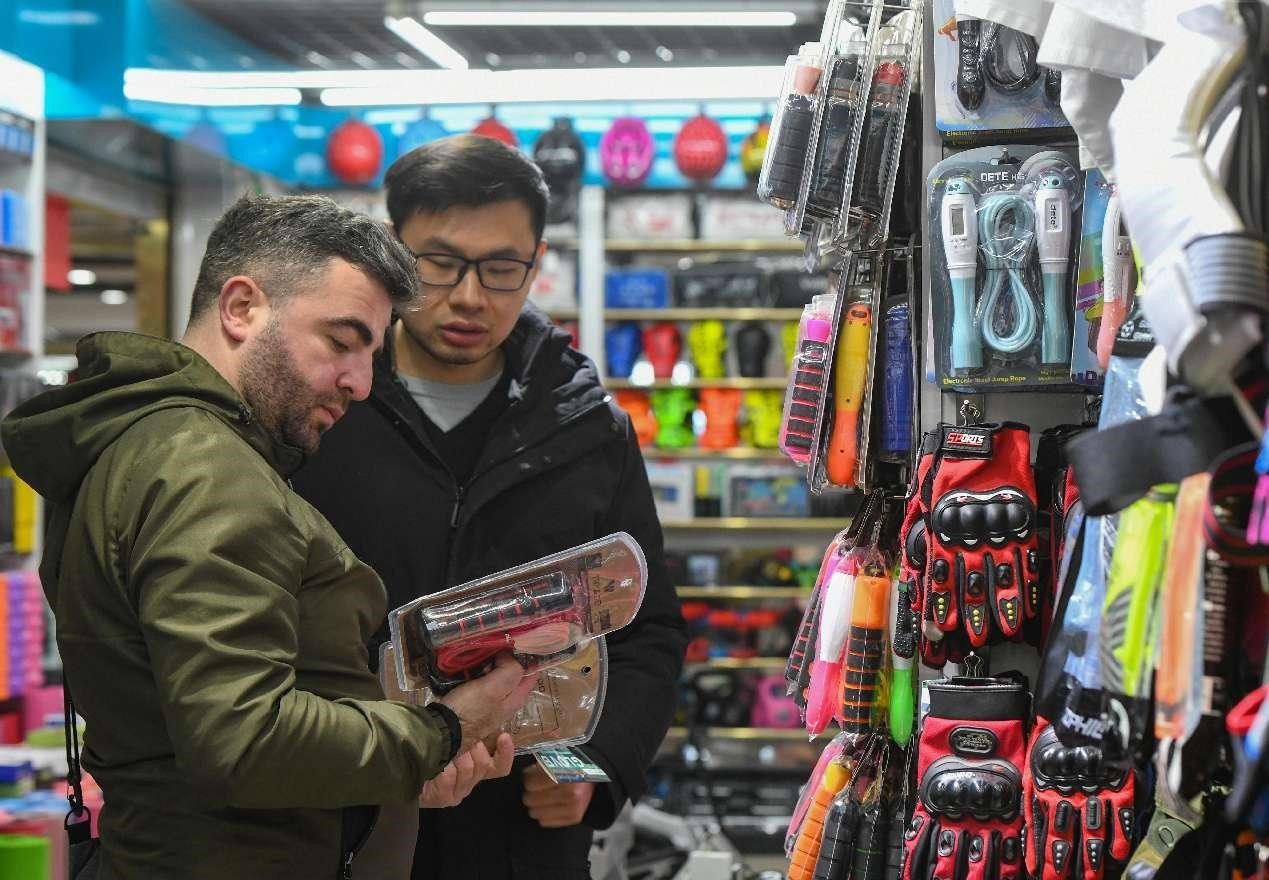Optimized mobile payment services delight foreigners in China
In recent years, China has witnessed rapid development of mobile payment and is at the forefront in this regard globally.
With the expansion of China's visa-free "circle of friends," the exchanges between Chinese and foreign nationals have become even closer, highlighting the increasing need for foreign nationals to make payments during their trips to China.

A merchant from Georgia purchases sports equipment at the Yiwu International Trade Market in east China's Zhejiang province. (People's Daily Online/Shi Kuanbing)
In response to this, China has been further optimizing its payment services, enhancing a multi-level and diversified payment service system, which arouses high expectations from foreign nationals. They believe China's efforts will make it more convenient for them to work, study and travel in China.
Stuart Wiggin, a British vlogger who has been living and working in Beijing for 16 years, is very accustomed to using mobile payment services. He believes mobile payment has been rapidly developing and is incredibly convenient in China, as he can use it on many applications and platforms.
For instance, when dining at a restaurant, he can use his phone to scan a QR code to order, and even apply discounts obtained from third-party applications like mini-programs. These services on different platforms can be seamlessly connected to each other.
Mahmoud, from Sudan, has been living and working in China for seven years. Recently, he was delighted to discover that WeChat allows direct binding of overseas bank cards, with further optimizations in card verification and name format. The international version of mobile payment application Alipay also supports the binding of overseas bank cards, which allows him to pay directly by scanning QR codes.
"This is great news for foreigners like me, as it makes consuming in China more convenient. I love this payment method. It is easy. I'm happy to see this," he noted.
On March 1, a mutual visa exemption agreement for ordinary passport holders between China and Thailand came into effect, leading to a noticeable increase in Thai tourists visiting China.

South Korean tourists pose for a picture at the Yantai Port in east China's Shandong province, Dec. 31, 2023. (People's Daily Online/Tang Ke)
"This is my second time traveling to China, and this time it's very convenient to pay for my purchases," said Thai tourist Chitpong. He said he carried a lot of cash when he visited China for the first time, which was quite inconvenient. This time, he downloaded popular Chinese mobile payment applications in advance, ensured that his mobile network would work well, and carried just some change. As a result, he enjoyed his trip with no payment problems.
Not long ago, Polish tourist Julia traveled to China with a tour group. The group was received by CYTS International Travel Co., Ltd. She surprisingly found that the travel agency provided tips on foreign currency exchange and purchasing mobile phone cards, including guidance on how to exchange petty cash and pay with foreign bank cards.
Hu Jiying, deputy general manager of CYTS International Travel Co., Ltd., said that when making small payments, it is advisable to have some cash on hand, so tour guides often assist tourists in withdrawing cash. For tourists who are interested in mobile payment, travel agencies and tour guides would help them download relevant apps on their phones, Hu added.
When opting for self-guided tours in China, some international visitors are more accustomed to paying in cash, including Mark from the United States.
On the first day of his trip to China, Mark took a taxi and the fare was 370 yuan ($51.4). He took out 400 yuan in cash, but the driver didn't have cash change and suggested transferring the payment through WeChat Pay. Mark didn't have the application on his phone, so he told the driver to keep the change. Unexpectedly, the driver drove to a nearby bank where he exchanged for a 200-yuan "change package," and gave Mark 30 yuan.
Mark said that the driver warmly introduced to him that Chinese banks now provide a "change package" service, which can exchange banknotes.

Foreign tourists walk on a glass-bottomed bridge at Zhangjiajie Grand Canyon, central China's Hunan province. (People's Daily Online/Wu Yongbing)
The service, providing consumers with exchanges for small banknotes, is now available in many Chinese banks. Later, Mark went to the bank and also exchanged for a 200-yuan "change package," which made it easier for him to buy food and souvenirs at small stores during his trip.
Charles from Cameroon is engaged in international trade and frequently travels between China and Cameroon. He remembered that a few years ago, the annual mobile payment limit for overseas travelers in China was relatively low. If the limit was exceeded, he had to go to the bank with his passport to apply for an increase, which was inconvenient for foreigners like him who regularly use mobile payment.
Additionally, it was complicated for foreigners to obtain a bank card and activate the mobile payment function as they were required to provide a lot of identification information, Charles added.
Recently, major payment platforms in China have raised the single transaction limit for foreign nationals using mobile payments from $1,000 to $5,000, and the annual cumulative transaction limit from $10,000 to $50,000. The registration, verification, and card binding processes have also been greatly optimized, which makes Charles very happy.
"It's pleased to see that Chinese payment platforms are seeking a balance between convenience and security, and these details demonstrate China's caring as the country expands high-level opening up," Charles said.
Photos
Related Stories
- China moves to further boost payment convenience for foreigners
- China issues e-CNY user guide to optimize mobile payment for foreigners
- Chinese payment platforms improve services, facilitating foreigners visiting China
- China unveils measures to optimize payment services
- China works to further improve payment convenience
Copyright © 2024 People's Daily Online. All Rights Reserved.









